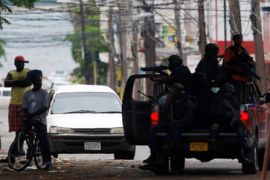Jamaica drug gangs ‘call the shots’
Author of award-winning “The Dead Yard: A story of Modern Jamaica” speaks to Al Jazeera.

 |
| A manhunt for alleged Jamaican drug baron Coke who is facing extradition to the US has proved deadly [AFP] |
Security forces in Jamaica say they are now in control of the alleged drug baron Christopher “Dudus” Coke’s stronghold after days of deadly fighting between them and the baron’s supporters, who are fighting his extradition to the US.
Ian Thomson, a Canadian author of The Dead Yard: A story of Modern Jamaica, which has just won the Ondaajte Prize, speaks to Al Jazeera about the country of “lost promise”.
Al Jazeera: Have you visited the areas of Jamaica that are under siege now?
Yes I did – these are in Western Kingston [capital] – which is the downtown area as distinguished from wealthier uptown. It was built as a housing project by the centre-right Jamaica Labour Party (JLP) – the party which “Dudus” Coke – the drug dealer at the centre of this conflict – is in the pay of.
A lot of the British press have described Tivoli Gardens as a hell hole but many parts are reasonable residential areas. When Haitians come to Jamaica they want to live in Tivoli Gardens – its a decent enough place to pitch a tent.
What was the sense of community there?
I usually went there with a local – often a priest. I came to the country with preconceptions that any tourist running around downtown would be the target of some violence. This isn’t true. I found in Tivoli Gardens a great friendliness and socialbility. But because of my skin colour – the fact that I was in those areas at all was a sign that I had lost my social place because no white person would usually wander around these places and that gave me a certain defence.
The conflict in Jamaica now centres on one man – Christopher “Dudus” Coke – he’s said to be an international criminal and a protector of the poor – which picture is more accurate?
I think it is very complicated. All the important institutions which protect the poor downtown – the church, the police, soup kitchens, schools – have moved uptown because it’s too dangerous. So in the absence of these institutions an alternative government has taken root. Someone like Dudus – he’s a drug lord but he gives to the poor; he sees to it that they are educated and provides food and a roof.
So this is pastoral care of a kind – but is it so altruistic – isn’t it all for his own power? There are people dying on the streets to protect him now.
Sure. The attitude to power in Jamaica is intimately linked to the slave system. It’s important to remember that Jamaica has been for 300 years an exceptionally brutal slave colony ruled by the British. So today every shanty town napolean wants to be an over-seer. The grand houses that many drug barons build for themselves are replicas of the great houses run by the British.
Your book pins much of Jamaica’s problems on the legacy of slavery? Why are other former slave colonies more stable, more peaceful?
This is a really difficult question to answer. There are theories. In Jamaica there was a great tradition of Maroon outlaws who escaped slavery and into the hills – there is a long history of defiance in face of authority, which we’re seeing on the streets of Tivoli Gardens now.
What about the government? Haven’t they failed?
Dudus is supposed to be closely connected to the government – the ruling JLP party who built Tivoli Gardens in 1966.
There’s been a long tradition in Jamaica of politics being connected to crime. It’s said in Jamaica that politicans keep the poor in a state of ignorance so they can be used as election fodder. It’s easier to manipulate the uneducated for political ends. It’s much easier for an uneducated kid to do the bad man’s bidding if he or she is scarcely literate.
Have the drug gangs effectively taken over from the government in terms of economics?
There has been a shift and a reversal of roles. In the murderous turf wars of 1970’s Kingston the gunmen were largely doing the bidding of the politicans. Now with the drugs trade so powerful – and Jamaica a key transhipment point in the drugs route out of South America – the narcotics barons are calling the shots the picture is more complicated – the politicians can now be sub-serviant to the drugs barons – they certainly have more money.